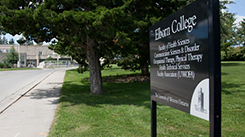Program Model and Course Descriptions
Developing Global Leaders
The overall vision and goal of Western’s MScOT program is:
- To graduate practitioners who are innovative global leaders in occupation, health and well-being, value social inclusion, challenge inequities, and promote social transformation through occupation.
- To improve the lives of individuals, families and communities.
Western’s MScOT program is informed by our Professional and Educational Conceptual Frameworks.
The central focus of our Professional Conceptual Framework, ‘harnessing the transformative power of occupation’, is congruent with the Canadian Occupational Therapy Competencies guiding document stating that occupational therapy is a health profession fundamentally concerned with access to, initiation of, and sustained participation in valued occupations within meaningful relationships and contexts (ACOTRO, ACOTUP, & CAOT, 2021).
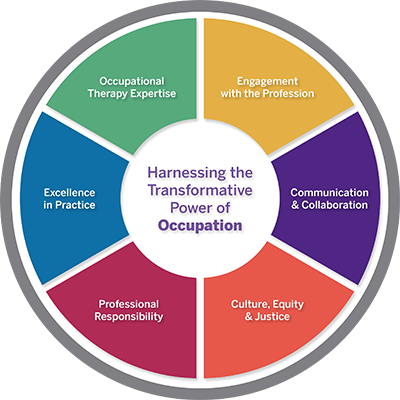
Our Educational Conceptual Framework integrates our five core themes, five signature pedagogies and five threads of learning that allow students to navigate the curriculum while developing core competencies for entry-level practice.
Educational Conceptual Framework Core Themes
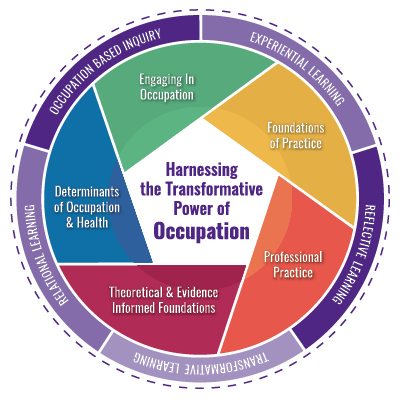 Determinants of Occupation & Health
Determinants of Occupation & Health
 Equipping students with the foundational knowledge of the intersecting personal and environmental conditions that influence occupational performance & engagement.
Equipping students with the foundational knowledge of the intersecting personal and environmental conditions that influence occupational performance & engagement.
Engaging in Occupation
 Enabling students to develop the competencies required for occupation-based assessment and intervention across practice settings.
Enabling students to develop the competencies required for occupation-based assessment and intervention across practice settings.
Foundations of Practice
 Developing occupation-based practice through the scaffolded application of fundamental occupational therapy capabilities.
Developing occupation-based practice through the scaffolded application of fundamental occupational therapy capabilities.
Professional Practice
 Advancing students’ development of a range of capabilities for professional practice at micro, meso and macro levels.
Advancing students’ development of a range of capabilities for professional practice at micro, meso and macro levels.
Theoretical & Evidence Informed Foundations
 Enabling students to develop in-depth understandings of occupation-based theoretical and evidence-informed foundations and critically apply them to transformative occupation-based practice.
Enabling students to develop in-depth understandings of occupation-based theoretical and evidence-informed foundations and critically apply them to transformative occupation-based practice.
Curriculum and Structure
- Two-year, six-term, full-time, course-based professional program
- Includes a combination of coursework and fieldwork placements/experiential learning
- Prepares graduates to write the National Occupational Therapy Certification Exam (NOTCE)
- Includes more than 1000 hours of fieldwork in experience
Class of 2026 Year 1: Structure and Course Descriptions
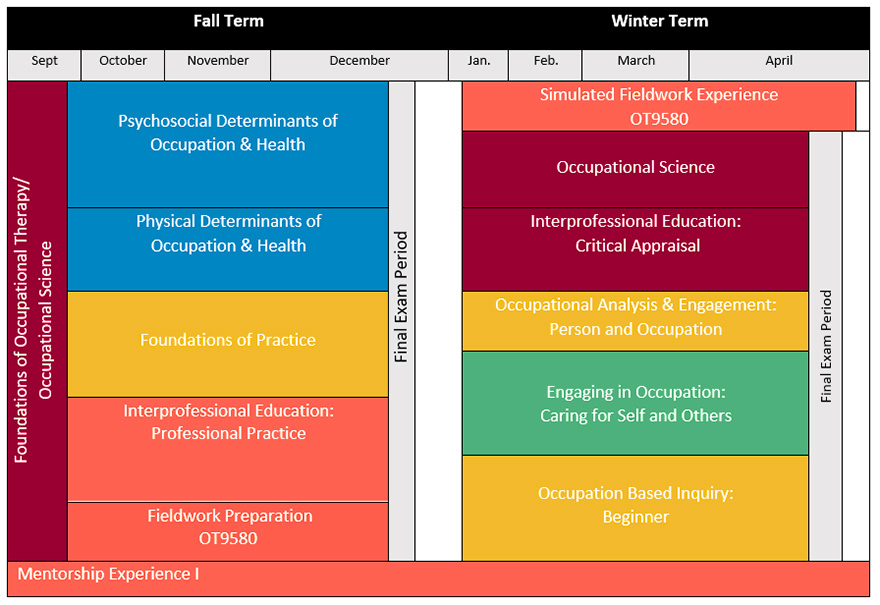
Year 1 Fall Term (Sept. - Dec.)
Foundations of Occupational Therapy and Occupational Science
Through this course, students will critically engage with the concepts of occupation and occupational performance and engagement, the transformative power of occupation, and its centrality in occupational therapy practice. Students will be exposed to theoretical underpinnings drawn from occupational science, critical social and cultural theories, as well as concepts, models, and frames of reference that underlie occupation-based practice. Students will also gain an understanding of the historical development of occupational therapy, its contemporary scope of practice, and emerging directions.
Physical Determinants of Occupation and Health
This course seeks to equip students with the foundational knowledge of the intersecting personal and environmental conditions that influence occupational performance and engagement, with a particular focus on physical determinants. Specifically, we will examine physical (e.g. neurological, musculoskeletal, cardiovascular) conditions commonly encountered in occupational therapy practice, spanning from the underlying physiological mechanisms to resulting occupational performance issues. This course, in conjunction with psychosocial determinants of occupation and health, will further contribute to a student’s ability to critically evaluate how occupational performance and engagement is mediated by environmental conditions.
Psychosocial Determinants of Occupation and Health
This course seeks to equip students with the foundational knowledge of the intersecting personal and environmental conditions that influence occupational performance and engagement, with a particular focus on psychosocial determinants. Specifically, we will examine psychoemotional (e.g. mood, anxiety, psychosis), and social (e.g. poverty, social exclusion, oppression) conditions commonly encountered in occupational therapy practice, spanning from the underlying psychological and social mechanisms resulting occupational performance issues. This course, in conjunction with physical determinants of occupation and health, will further contribute to a student’s ability to critically evaluate how occupational performance and engagement is mediated by environmental conditions.
Foundations of Practice
This course will enable students to develop foundational skills required for practice, such as interviewing, movement and handling, range of motion and manual muscle testing. Through experiential learning and a functional understanding of musculoskeletal systems and structures, students will apply their developing knowledge of occupational performance and engagement, professional reasoning, and client-centred principles to occupational therapy practice.
Interprofessional Education: Professional Practice
This course will prepare students for professional practice as an autonomous regulated healthcare practitioner in ever-changing and complex practice environments. Students will be introduced to the concepts of professionalism and to the attitudes, values, competencies and accountabilities associated with being a regulated healthcare professional. Students will develop capabilities for reflective practice, professional reasoning and explore how to enact professional behaviours in relation to the client, the interprofessional team, organizational environments, professional associations and regulatory bodies.
Fieldwork Preparation: Knowledge in Action (Level 1)
Fieldwork courses in the MScOT program are organized into a preparation portion and a practicum portion. As this is the first fieldwork course in the program, the preparation portion contributes to students’ early capacities to develop professional citizenship, professional reasoning, and professional presence, which will continue to be developed and enacted during the practicum portion of the course. Through the practicum portion, students will complete 150 hours, of fieldwork with evaluation from community partners and course instructors. Within the course, students are exposed to different components of the practice process where they work to reflexively apply the knowledge they have developed during their initial coursework, and the knowledge they develop within the simulation practicum.
Mentorship Experience I
This course will focus on supporting students to develop capabilities regarding professional reasoning, reflection, collaboration, self-directed learning, professional development, and awareness of self and others to support professional practice as occupational therapists. Students will attend foundational, large-group classes to support learning in ongoing seminars, which will entail working in small groups with an occupational therapist mentor. The primary teaching method in seminars will be problem-based learning using practice scenarios.
Year 1 Winter Term (Jan. - April)
Fieldwork Practicum: Knowledge in Action (Level 1)
Fieldwork courses in the MScOT program are organized into a preparation portion and a practicum portion. As this is the first fieldwork course in the program, the preparation portion contributes to students’ early capacities to develop professional citizenship, professional reasoning, and professional presence, which will continue to be developed and enacted during the practicum portion of the course. Through the practicum portion, students will complete 150 hours, of fieldwork with evaluation from community partners and course instructors. Within the course, students are exposed to different components of the practice process where they work to reflexively apply the knowledge they have developed during their initial coursework, and the knowledge they develop within the simulation practicum.
Interprofessional Education Critical Appraisal
This course is designed to provide students with the knowledge base and opportunities to develop the skills required to critically appraise a diverse range of research methodologies and clinical literature. Through online modules, in-class discussions and interprofessional education (IPE) journal clubs, students will begin the process of becoming sophisticated consumers of research literature, thus developing the skills required to update their research knowledge bases throughout their careers.
Occupational Science
In this course students will gain an understanding of the historical development of occupational science, key concepts, the situated nature of occupation, and relationships between occupational science and occupational therapy. Students will be challenged to consider the possibilities and limitations of dominant understandings of occupation. Students will innovatively consider how occupational science concepts apply to current and future occupation-based practice.
Occupational Analysis & Engagement: Person and Occupation
This course will enable students to develop capabilities required for optimizing person-environment-occupation fit. Students will work towards proficiency in identifying person 8related strengths and challenges, as well as the analysis and modification of occupations. Students will develop capabilities related but not limited to observation, occupation-based goal setting and documentation.
Engaging in Occupation: Caring for Self and Others
Through this course students will develop the capabilities required for analyzing, understanding, and addressing the fit between the client, the environment, and the occupations that relate to caring for self and others across the life span. Caring for self and others, including immediate and extended family, reflects a holistic transactional approach to enabling engagement in basic and instrumental activities of daily living.
Occupation Based Inquiry: Beginner
In this course, students will begin to synthesize the knowledge and capabilities they have learned in the classroom and in fieldwork, working toward consolidation of the essential competencies. Through case-based learning, students will apply beginner level professional reasoning skills to a variety of scenarios focused on optimizing occupational performance and engagement across the lifespan.
Class of 2026 Year 2: Structure and Course Descriptions
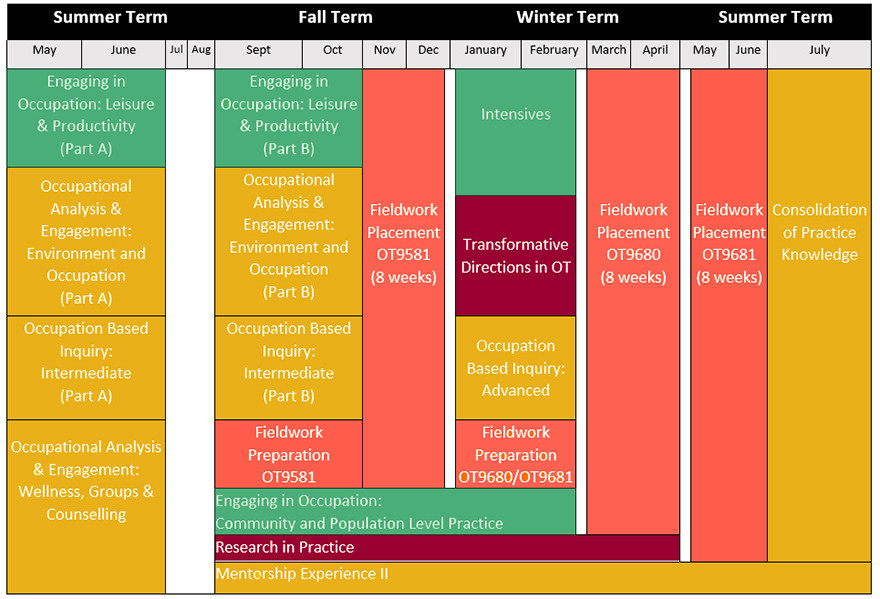
Year 2 Summer and Fall Terms (May - December)
Occupational Analysis & Engagement: Environment and Occupation
This course will enable students to develop capabilities required for optimizing person-environment-occupation fit. Students will interact with a range of home and environmental modifications and assistive technology, and apply that knowledge through experiential and case-based learning.
Engaging in Occupation: Leisure and Productivity
Through this course students will develop the capabilities required for analyzing, understanding, and addressing the fit between the client, the environment, and the occupations that relate to leisure, play, and productivity across the life span. This course will focus on how to optimize possibilities for people to engage in leisure, play, and productivity occupations that they need and/or want to do.
Occupational Analysis and Engagement: Well-Being, Groups and Counselling
In this course, students will develop the fundamental skills to design, deliver and evaluate groups, counsel clients and implement wellbeing initiatives to support their clients and their own professional practice. Through experiential learning, students will apply counselling skills and group facilitation strategies to support the occupational performance and engagement of their clients across practice settings.
Occupation Based Inquiry: Intermediate
In this course, students will build on the knowledge and capabilities they have learned in the classroom and in fieldwork, working toward consolidation of the essential competencies. Through case-based learning, students will apply intermediate level professional reasoning skills to a variety of increasingly complex scenarios focused on optimizing occupational performance and engagement across the lifespan.
Engaging in Occupation: Community and Population Level Practice
Through this course students will develop the capabilities required for practice at organization, community and societal levels, oriented toward social and occupational justice, including understanding, analyzing and addressing the social landscape through advocacy that enables occupation and system change. Students will engage in integrated fieldwork activities involving promoting the profession of occupational therapy and working with a community partner to enact change.
Research to Practice
Drawing on the foundational knowledge and skills related to research and evidence based practice developed in IPE Critical Appraisal, this course will provide students with practice in critically evaluating the evidence base relevant to a clinical question. Working in small groups, students will complete a critically appraised topic and present their research findings.
Mentorship Experience II
This course will focus on supporting students to develop capabilities regarding professional reasoning, reflection, collaboration, self-directed learning, professional development, and awareness of self and others to support professional practice as occupational therapists. Students will attend foundational, large-group classes to support learning in ongoing seminars, which will entail working in small groups with an occupational therapist mentor. The primary teaching method in seminars will be problem-based learning using practice scenarios.
Fieldwork Preparation and Placement: Reflection on Action (Level 2)
Fieldwork courses in the MScOT program are organized into a preparation portion and a practicum portion. The preparation portion of this course continues to foster students’ capacities to develop professional citizenship, professional reasoning, reflexive application and development of knowledge, and professional presence, which will continue to be developed and enacted during the practicum portion of the course. This includes reflecting on their first fieldwork experience, and their developing capabilities, and to identify areas for continued personal and professional growth. Through the practicum portion, students will complete eight full-time weeks, i.e., 300 hours, of fieldwork under the supervision of a preceptor. Within a particular practice area, students participate in the different components of the practice process where they reflexively apply the knowledge they have developed during their coursework, and the knowledge they continue to develop within the practicum.
Year 2 Winter Term (Jan. - April)
Transformative Directions in OT
In this course students will explore directions in occupational therapy practice that use occupations as a catalyst for societal transformation. Students will examine contemporary approaches for transformative occupational therapy, gain an understanding of key critical theoretical underpinnings, and heighten their awareness of socio-political conditions that shape and perpetuate occupational inequities at local to global scales. Students will also explore the implications of various forms of diversity for enacting societal change and challenges to embracing transformative approaches.
Occupation Based Inquiry: Advanced
In this course, students will refine knowledge and capabilities they have learned in the classroom and in fieldwork, working toward consolidation of the essential competencies. Through case-based learning, students will apply advanced level professional reasoning skills to complex scenarios focused on optimizing occupational performance and engagement across the lifespan.
Intensives
This course will enable students to refine their occupational therapy capabilities and professional reasoning, and apply them to specific areas of practice. From a diverse range of practice settings and populations, each student will select two intensives and explore the chosen topics in depth. By providing flexibility and choice, these intensives offered primarily by the clinical community, also promote students’ practice management capabilities and a commitment to life-long learning.
Fieldwork Preparation and Placement: Towards Reflection in Action (Level 3A)
Fieldwork courses in the MScOT program are organized into a preparation portion and a practicum portion. The preparation portion of this course continues to foster students’ capacities to develop professional citizenship, reflexive application and development of knowledge, and professional presence, which will continue to be developed and enacted during the practicum portion of the course. This includes reflecting on their earlier fieldwork experiences, and their developing capabilities, and to continue to identify areas for personal and professional growth. Further, at this stage students reflect on ethical issues and discern possibilities for positive action (phronesis and praxis). Through the practicum portion, students will complete seven full-time weeks, i.e., 263 hours, of fieldwork under the supervision of a preceptor. Within a particular practice area, students transition to completing the practice process with a partial workload or caseload, in consultation with their preceptor. Through this transition, students reflexively apply knowledge and use various forms of reflection while engaging in the practice process, building on the capabilities they have developed during their earlier coursework and fieldwork experiences, and integrating the knowledge they continue to develop within the practicum.
Fieldwork Preparation: Reflection in Action (Level 3B)
Fieldwork courses in the MScOT program are organized into a preparation portion and a practicum portion. The preparation portion of this course continues to foster students’ capacities to develop professional citizenship, reflexive application and development of knowledge, and professional presence, which will be enacted during the practicum portion of the course. This includes reflecting on their earlier fieldwork experiences, and their developing capabilities, and to continue to identify areas for personal and professional growth. Further, at this stage students critically reflect on systemic factors that shape practice, and to discern possibilities for transformative action. Through the practicum portion, students will complete eight full-time weeks, i.e., 300 hours, of fieldwork under the supervision of a preceptor. Within a particular practice area, students transition to completing the practice process with a full workload or caseload, in consultation with their preceptor. Through this transition, students reflexively apply knowledge and use various forms of reflection while engaging in the practice process, building on the capabilities they have developed during their earlier coursework and fieldwork experiences, and integrating the knowledge they continue to develop within the practicum.
Year 2 Summer Term (May - Aug.)
Fieldwork Placement: Reflection in Action (Level 3B)
Fieldwork courses in the MScOT program are organized into a preparation portion and a practicum portion. The preparation portion of this course continues to foster students’ capacities to develop professional citizenship, reflexive application and development of knowledge, and professional presence, which will be enacted during the practicum portion of the course. This includes reflecting on their earlier fieldwork experiences, and their developing capabilities, and to continue to identify areas for personal and professional growth. Further, at this stage students critically reflect on systemic factors that shape practice, and to discern possibilities for transformative action. Through the practicum portion, students will complete eight full-time weeks, i.e., 300 hours, of fieldwork under the supervision of a preceptor. Within a particular practice area, students transition to completing the practice process with a full workload or caseload, in consultation with their preceptor. Through this transition, students reflexively apply knowledge and use various forms of reflection while engaging in the practice process, building on the capabilities they have developed during their earlier coursework and fieldwork experiences, and integrating the knowledge they continue to develop within the practicum.
Consolidation of Practice Knowledge
In this fully online course, students will proficiently consolidate and demonstrate the competencies they have learned in the classroom and in fieldwork. By doing so, they will individually refine their professional reasoning and practice management skills required to become scholarly practitioners committed to client-centred and evidence-informed practice. Through case-based learning, students will engage in simulated scenarios, from initiation of the therapeutic relationship through to discharge.

